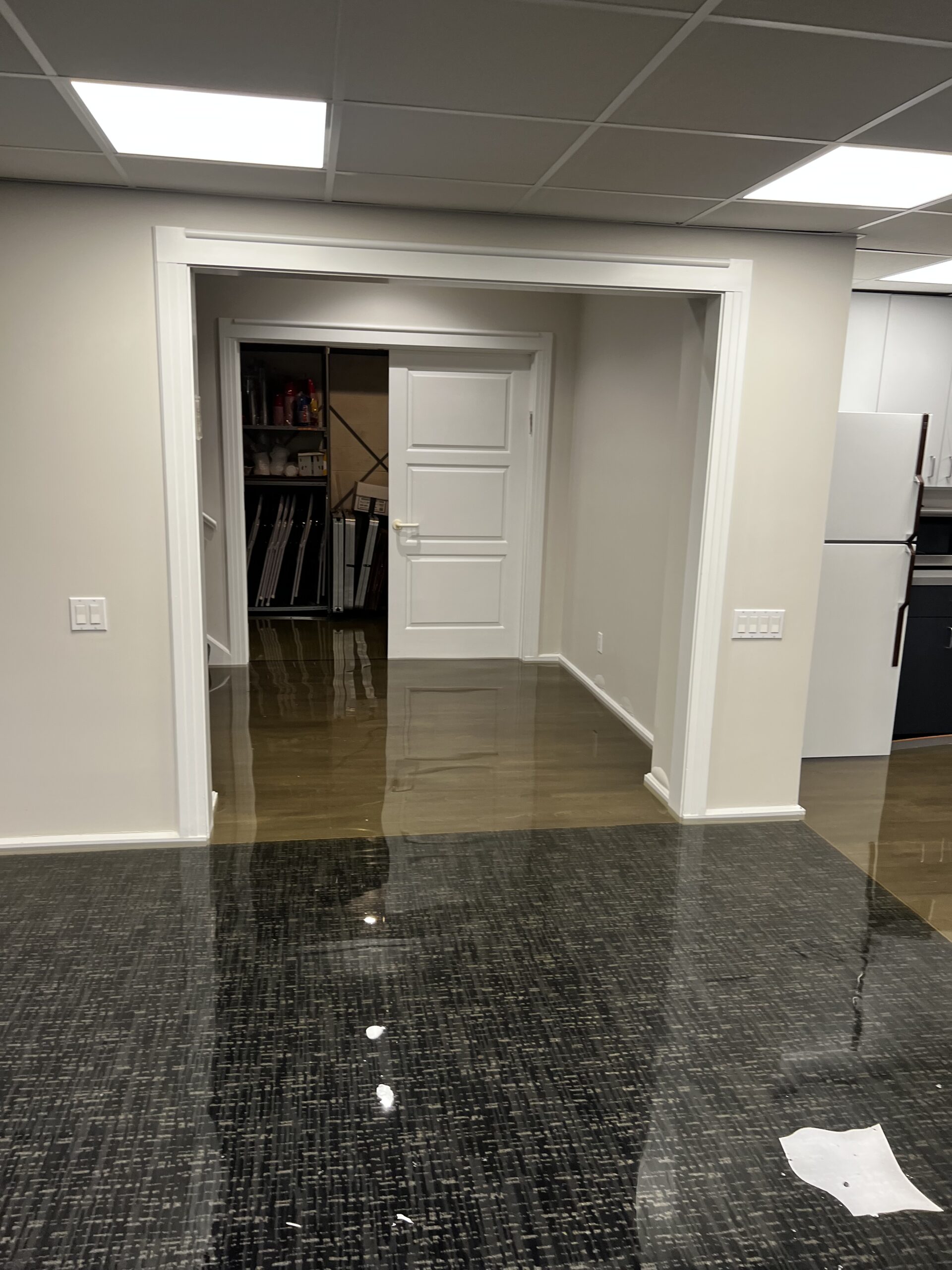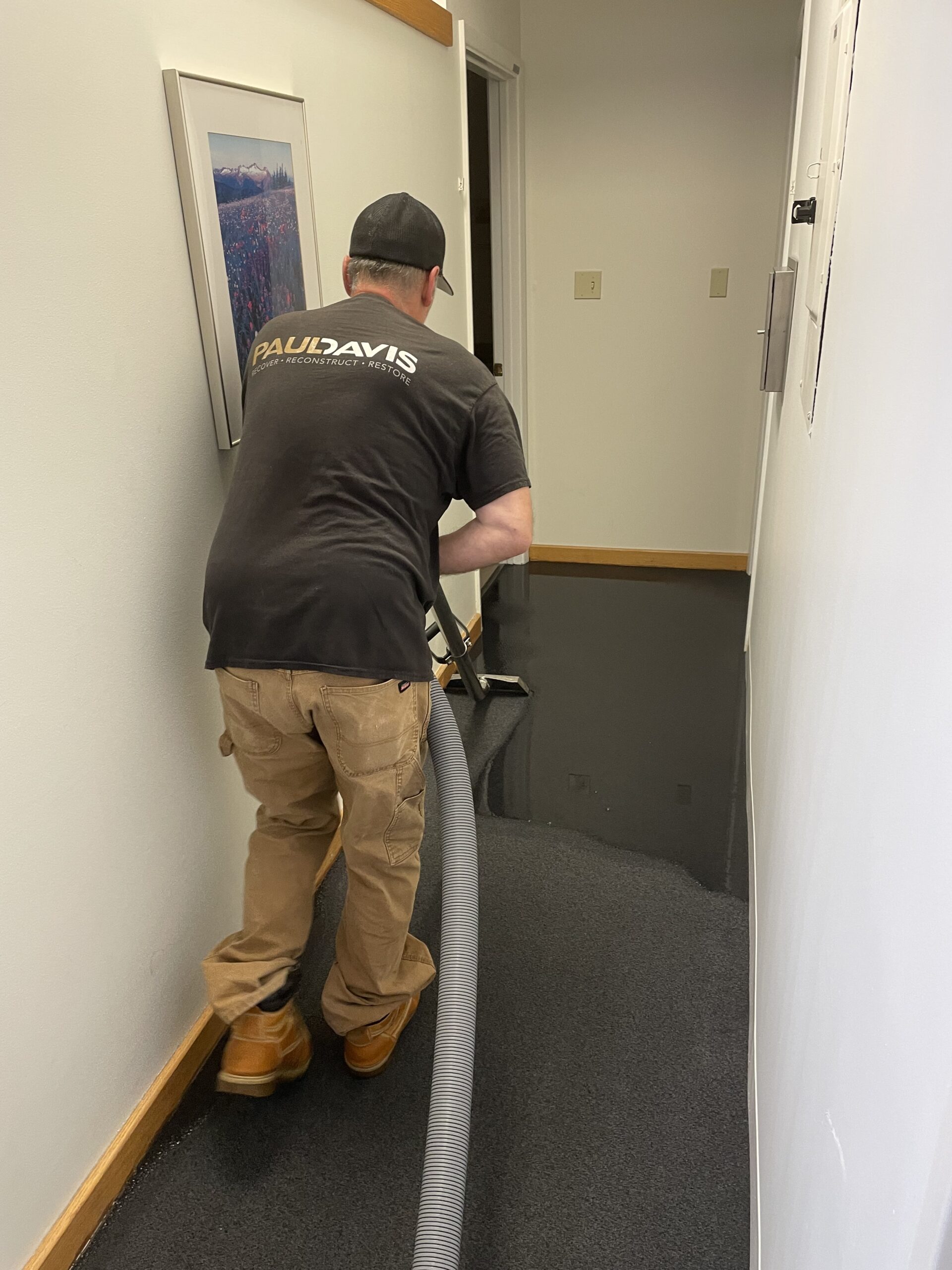Paul Davis’s Expert Guide to Basement Flood Cleanup Akron

Basement flooding can be a homeowner’s worst nightmare, especially in Akron, Ohio, where our unique climate and geography make this issue all too common. Standing water in your basement can cause large amounts of damage, mold, and mildew. Not only do basement floods cause external damage, but they can be very intense, stressful, and anxiety-riddled events for homeowners.
Whether you’re dealing with a current flood or want to prevent future incidents, the following sections will equip you with sewage cleanup knowledge and solutions. From understanding the local causes of flooding to professional water damage restoration services, we’ll cover everything you need to know to protect your home and belongings.
Need help restoring your flooded basement? Leave it to the experts at Paul Davis.
Causes of Basement Flooding
Whatever causes your flooding, our technicians will be able to restore your flooded basement to its original state to prevent future flooding. Some common causes of basement water damage include the following:
- Broken pipes.
- Failed sump pumps.
- Sewage or storm backup.
- Weeping tile failure.
- Overland flooding caused by extreme weather.
- Improperly installed window.
- Leaky water heater.
- Heavy rains or snowmelt can cause soil saturation, creating intense hydrostatic pressure and resulting in water seepage through the basement floor, walls, drainage system, or foundation.
- Loose soil surrounding your foundation may absorb water. When it expands, it puts pressure on the foundation, resulting in leaks and foundation damage.
In Akron, clay-rich soil can exacerbate flooding issues. When saturated, this soil expands and puts pressure on foundations, increasing the likelihood of water intrusion. It’s especially concerning if you find excess water pooling on the floor or leak stains on the walls. A basement flood can lead to foot-deep water and result in severe structural damage if left untreated.
Consequences and Risks of a Flooded Basement
Not only can standing water in your basement be messy and damaging, but it can also pose health risks, and it is important to invest in water damage repair as soon as possible. Some of the biggest risks of basement water damage include:
- Exposure to harmful bacteria
- Electrical shock due to exposed electrical wiring submerged in flood water
- Development of mold due to excess water
Immediate Steps for Basement Water Damage Cleanup
In the event that your basement floods, you may be able to drain the flooded area with a backup sump pump, wet vacuum, or even a pool pump. Additionally, follow these steps:
- Contact your local city water department to check sewage mainline conditions.
- Turn off the area’s power and do not enter until you are certain that it is off.
- Wear protective gear at all times when entering the area, as floodwater can have dangerous health risks, particularly if it’s coming from a sewer drain.
- Call Paul Davis Akron and have our certified technicians handle the water removal.

Emergency Services
At Paul Davis Akron, we offer 24/7 emergency services to assist you when you need us. Our IICRC-certified technicians will assess the cause and extent of the basement water damage and remove standing water and residual moisture before beginning water damage restoration services.
Basement Flood Restoration
We will work with you and the insurance company to ensure that your claims are handled correctly. Depending on the scale of the water damage, our full cleanup process can be completed in as little as three days.
Assessment
When our technicians arrive on the scene, they will determine the source of the flooding and assess the extent of the water damage. We’ll pinpoint the origin, whether the drainage system is causing sewage backup, a pipe burst, or a leaky foundation is causing flooding.
Mold and Mildew Prevention
Any items affected by the flooding will be removed, cleaned, and restored if possible. As soon as all pooled water has been removed from the basement, all affected areas will be dried out. Mold and mildew can develop in these areas and pose health risks in your home.
Full Restoration
At Paul Davis Akron, we use specialized equipment and techniques to dry your flooded basement and prevent mold and mildew damage. Dealing with insurance while worrying about your property can be stressful. At Paul Davis, we work with insurance providers to settle claims quickly and accurately.
Call Paul Davis in Akron today, and let us be your best friend on your worst day!
How to Prevent Basement Floods
Here are some precautions you can take to prevent basement flooding:
- Clogged sump pumps can cause flooding, so regularly maintain sump pumps to ensure they’re running properly
- Seal cracks in your home’s foundation, including your basement floor and walls
- Clean out your gutters
- Check your home’s pipes to check none are cracked or broken
- Ensure your property’s grading slopes away from the foundation to direct water away from your home
FAQs
Is it normal for my basement to flood?
Unfortunately, basements are prone to flooding. They are built at the lowest level of the building, and sometimes, the surrounding groundwater level is higher than the basement floor. When water levels rise above floor level, gravity will try to push the water into your basement. If there is an opening — like a crack in the foundation walls — you may end up with a wet basement.
Can you fix a basement that floods?
You can fix basement flooding with the help of restoration and remediation specialists. You may be able to seal the source of a leak with polyurethane caulk or hydraulic cement, but full restoration of a flooded basement usually requires professional expertise. Call Paul Davis Akron for professional and timely water damage restoration services.
Why is my basement all of a sudden flooding?
Sudden basement flooding may be caused by sewer backups, damaged pipes, or broken water heaters. Even heavy rain can seep through windows and foundation cracks. If you cannot spot the flooding cause, an assessment and basement flooding repairs can be done by a trained professional.
What should I do if my basement is flooded?
Act quickly to minimize water damage. Follow these steps:
- Call your insurance company and report the flood. Take photos and videos to send them.
- Call the utility company to shut off your power.
- Wear protective gear like boots, gloves, and a mask when entering standing water.
- If possible, determine the source of the water in your basement.
- Call Paul Davis Akron for water extraction, restoration and cleaning, and insurance claim assistance.
How do I dry my basement after a flood?
After removing standing water, dry your basement by opening windows, running fans for air circulation, and using a dehumidifier. Extensive drying services are best left to professionals who can locate and get rid of dangerous mold from basement floods.
Is basement flooding a big deal?
Yes. When basements flood, it can damage flooring, walls, carpeting, furniture, and personal possessions. If the excess water is not removed promptly and completely, it might lead to mold. Standing water can be a safety hazard if it is in contact with exposed cords or electrical outlets. It may also contain harmful sewage and bacteria.









